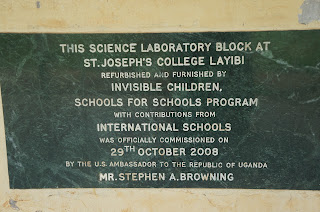It is interesting to be a teacher
in the era of globalization. In many respects we do live in a global village.
We all eat, sleep, love, learn, have families, listen to music, enjoy friends,
work, play, and try to get through each day the best we can. In other ways, we live
very different lives. This was most recently brought to my attention because my
eighteen year old daughter, who is spending the year in Senegal, just came face
to face with the kind of violence, that while not uncommon here- is condemned-
but in Senegal is culturally accepted.
Her host mom beat her host sister so violently that the daughter lost
some of her hair and had a broom broken over her head; all because she had not
cooked Emma’s dinner yet. There are many
cultures that accept violence towards each other as normal. Kristine referred
to some in her recent blog post about Malala, and the women around the world documented
in Half the Sky. As teachers in
Uganda, we had to stand by while children were caned. You might wonder why we
stood by, why could we not just step in front of the teacher with the cane and
stop them. As teachers in America we are federally mandated to report suspected
child abuse. It is our job to help kids, not just to learn, but to show them
how important each and every one of them is, what their potential is, and to believe
in them - sometimes when no one else does.
Change does
not happen because we wish it, or pray for it, or donate a room full of
computers to a school with no electricity. Change happens because we set an
example, we educate, and we work within the cultural norms to make a personal
connection with other human beings on the planet in the hope that we can learn
from each other.
Educate for
Change is taking a small group of students to Uganda this summer to make that
connection. Simple human to human contact is how we will truly become the
change we want to see in the world.


























































